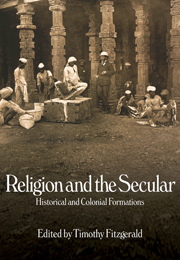Book contents
- Frontmatter
- Dedication
- Contents
- Acknowledgements
- Contributors
- Introduction
- 1 Dialectics of conversion: Las Casas and Maya colonial Congregación
- 2 A higher ground: the secular knowledge of objects of religious devotion
- 3 Secularizing the land: the impact of the Alaskan Native Claims Settlement Act on indigenous understandings of land
- 4 The formative process of State Shinto in relation to the Westernization of Japan: the concept of ‘religion’ and ‘Shinto’
- 5 Religious and secular in the Vietnam War: the emergence of highland ethno-nationalism
- 6 Colonialism all the way down? Religion and the secular in early modern writing on south India
- 7 Understanding politics through performance in colonial and postcolonial India
- 8 Real and imagined: imperial inventions of religion in colonial southern Africa
- 9 Religion in modern Islamic thought and practice
- 10 Rudolf Otto, cultural colonialism and the ‘discovery’ of the holy
- 11 Encompassing Religion, privatized religions and the invention of modern politics
- 12 Colonialism and the myth of religious violence
- Index
2 - A higher ground: the secular knowledge of objects of religious devotion
- Frontmatter
- Dedication
- Contents
- Acknowledgements
- Contributors
- Introduction
- 1 Dialectics of conversion: Las Casas and Maya colonial Congregación
- 2 A higher ground: the secular knowledge of objects of religious devotion
- 3 Secularizing the land: the impact of the Alaskan Native Claims Settlement Act on indigenous understandings of land
- 4 The formative process of State Shinto in relation to the Westernization of Japan: the concept of ‘religion’ and ‘Shinto’
- 5 Religious and secular in the Vietnam War: the emergence of highland ethno-nationalism
- 6 Colonialism all the way down? Religion and the secular in early modern writing on south India
- 7 Understanding politics through performance in colonial and postcolonial India
- 8 Real and imagined: imperial inventions of religion in colonial southern Africa
- 9 Religion in modern Islamic thought and practice
- 10 Rudolf Otto, cultural colonialism and the ‘discovery’ of the holy
- 11 Encompassing Religion, privatized religions and the invention of modern politics
- 12 Colonialism and the myth of religious violence
- Index
Summary
Fitzgerald argues in the Introduction that secularism is best understood as a way of circumscribing ‘religion’, of marking it off from other things that we do. In this chapter I argue, following the anthropologist Michael Lambek, that secularism does this by looking in on ‘religion’ as if from the outside (2003: 3). I propose not just one but several reasons why people choose to take this secular perspective, I note that there are different varieties of it and I observe that a wide range of people, including Catholic priests, take such a perspective. I focus on secular knowledge rather than the secular politics on which most of the other chapters focus, and I look in particular at the knowledge of history, which also happens to be the key genre of this volume. I end by placing secularism within the broader politics of knowledge that the literary critic Walter Mignolo has termed “modern/colonial” (2000: 22). By this I mean that the secular perspective has developed, possibly since the sixteenth century, as a way of marking the difference between peoples.
It is often said of history that it is a secular kind of knowledge. I had taken that claim to mean that history banished divine agency from its narratives, thus contesting the previously dominant narratives of the church and other religious authorities. There are of course histories that do this, some of which are frankly anti-clerical. However, other histories do find a place for divine agency and yet I still want to call them secular because divine agency is placed outside the main body of the narrative.
- Type
- Chapter
- Information
- Religion and the SecularHistorical and Colonial Formations, pp. 47 - 70Publisher: Acumen PublishingPrint publication year: 2007



